Thon Tha Village: A Serene Haven At The Foot Of Tay Con Linh
Thon Tha Village, a recently discovered gem, has quickly become a favorite among travelers for its serene landscapes and rich Tay culture. Join MOTOGO Tours to uncover what makes this village so enchanting!
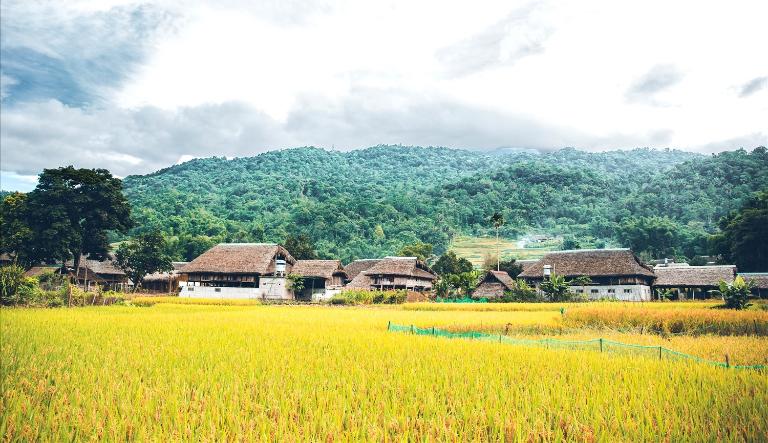
Introduction to Thon Tha Village
Thon Tha Village presents a real window into the customs and way of life of the ethnic Tay people (one of the ethnic minorities in Ha Giang) from Vietnam. Renowned for its traditional stilt homes and breathtaking scenery, this little town welcomes guests to really experience the simplicity and beauty of country life.
Where is Thon Tha?
Ha Giang province in the extreme north of Vietnam hosts Thon Tha Village. It belongs to Phuong Do, Ha Giang City. About 300 kilometers north of Hanoi, it is near the China border in an area noted for its breathtaking scenery and rich cultural diversity. Thon Tha covers an area of 120 hectares, with 124 households and a population of 592, 99% of whom are of the Tay ethnic group. Currently, the village has 122 stilt houses, over 90% of which retain their traditional architectural style.
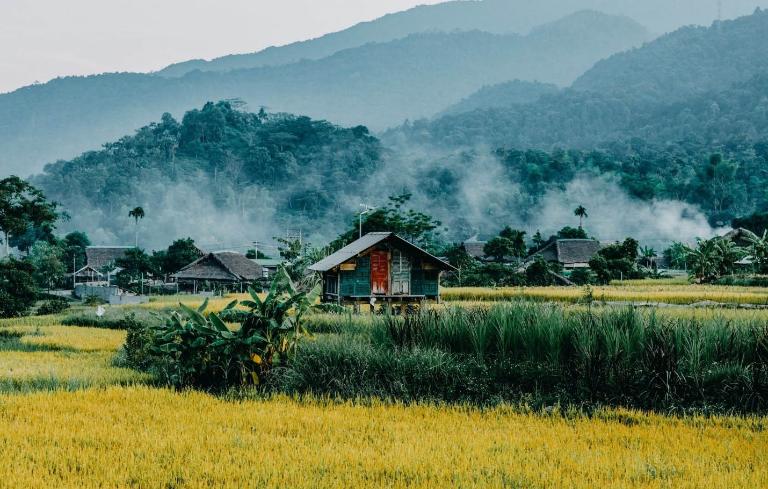
For anyone living in or passing through Ha Giang city, the village itself is rather easily reachable. Ha Giang city is part of Ha Giang is well-known for its mountain passes and meandering paths, while Thon Tha presents a more subdued, leisurely experience highlighting the calm beauty of Vietnam’s highlands.
A Brief History of Thon Tha
Thon Tha Village has roots firmly rooted in the customs of the Tay ethnic group, hundreds of years ago. Renowned for their work, agriculture, and strong culture, the Tay people have helped Thon Tha become the tranquil sanctuary it is today. Built from natural materials like bamboo and wood, the distinctive architectural style of the village symbolizes their cultural legacy. Traditional stilt homes.
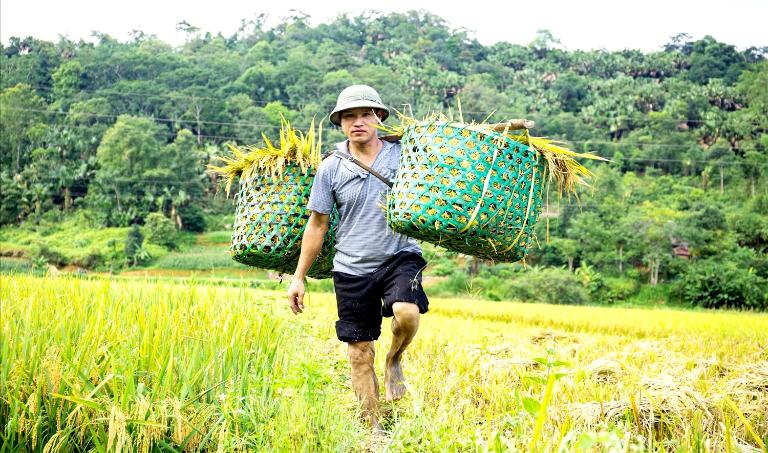
Maintaining customs including rice farming, needlework, and wood carving that reflect their way of life, generations of the Tay people have developed a deep relationship to the earth. Thon Tha has grown more easily available in recent years, drawing a small number of visitors eager to personally encounter Tay culture
How to Get to Thon Tha Village
Visiting Thon Tha Village often begins with a journey from Hanoi, Vietnam’s bustling capital. Most visitors find it easiest to travel first to Ha Giang city, which is just a short distance from Thon Tha itself. One of the most popular options for reaching Ha Giang is the overnight bus from Hanoi.

The journey typically takes between six to eight hours, and on arrival in Ha Giang city, it’s only a quick five to ten-minute drive to reach Thon Tha Village. Because the village is located at the foot of Tay Con Linh, just 6 km from Ha Giang city center.
Perfect time to travel
What kind of experience you are looking for will determine when the optimum time to visit Thon Tha Village. From March to May, the landscape comes alive in spring with rich vegetation; the rice terraces are vivid and new.
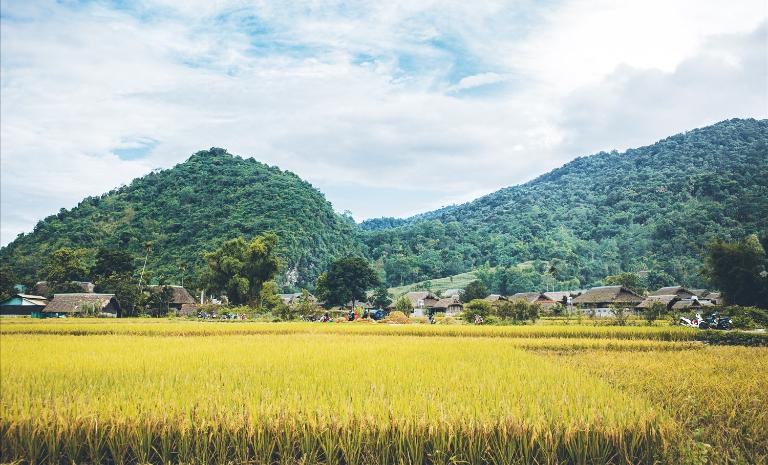
Ha Giang’s rainy season is summer, which runs from June through August. Nonetheless, it is also the time the rice fields reach their most richness. Although regular rain showers imply it’s recommended to take waterproof gear if you intend to visit during this season, the breathtaking scene of deep green fields is presented here.
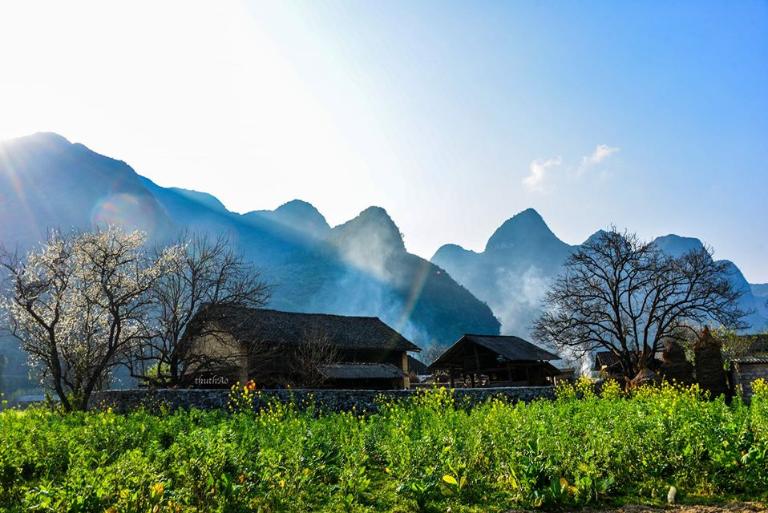
Autumn, from September to November, is the most often visited season when the rice terraces turn a beautiful golden yellow right before the harvest season. Trekking and mountain exploration around the town would be best during autumn when the temperature is cooler and clear sky abound.
Investigating the Local Culture
Offering a rare opportunity to travel back in time and witness rural Vietnamese life as it has been for generations, Thon Tha Village is a treasure store of Tay ethnic culture. Architecture, customs, traditional crafts, and cuisine all mix in this little but energetic community to produce a distinctive cultural experience.
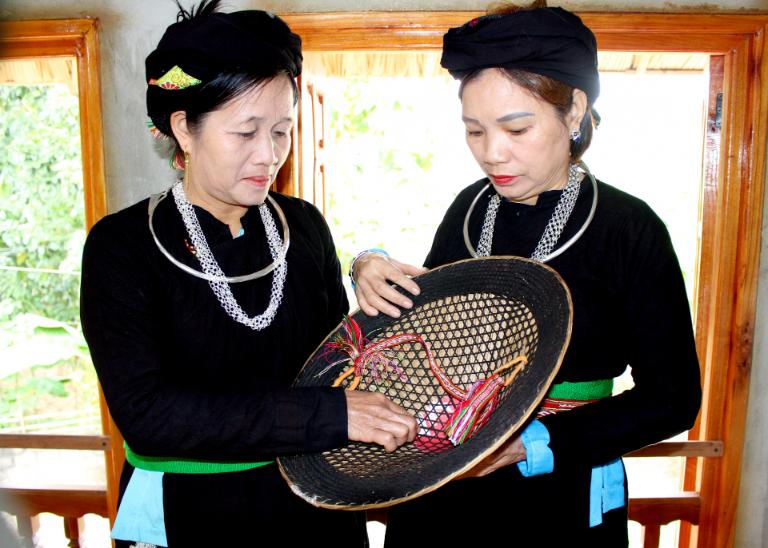
Conventional Tay Building Styles
The first thing guests in Thon Tha Village notice is the quite remarkable traditional Tay architecture. The Tay people build their houses stilt-style, or nha san. Built mostly of bamboo and wood, these stilt homes rise off the ground on robust wooden pillars.
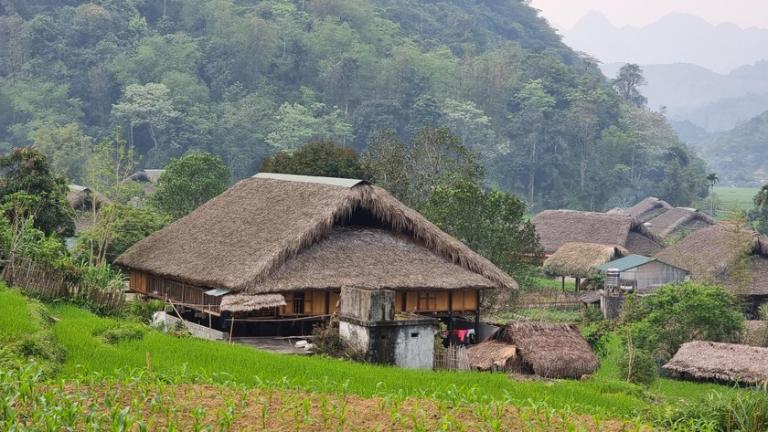
Usually thatched, roofs provide ventilation and durability; walls are spun from bamboo, allowing for this as well. Often focused on a heated hearth that forms the core of the house, these modest yet utilitarian dwellings provide areas for cooking, sleeping, and family gatherings.
Daily activities and customs
Thon Tha’s daily existence moves slowly. Farming is common in communities where people cooperate in the rice fields sharing resources and assistance. Families keep tight relationships, and hospitality defines the community in many ways. Open arms welcome visitors, who are often encouraged to participate in daily events including fishing, weaving, or even rice farming thereby providing them with a hands-on view of local life.
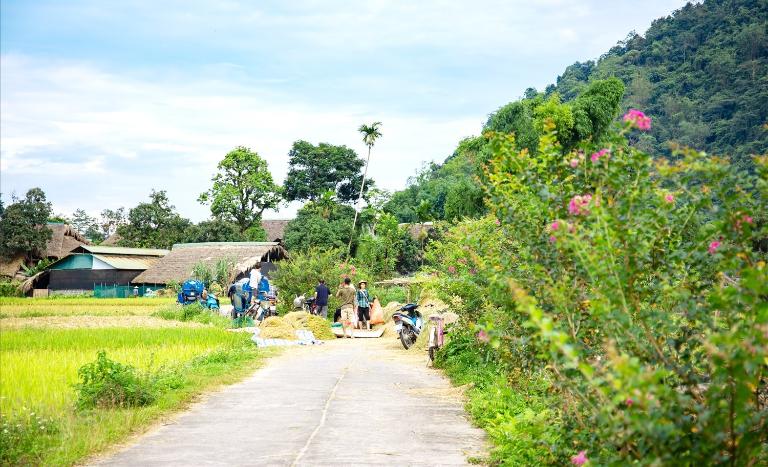
Thon Tha’s customs are intimately related with communal life and agricultural rhythms. The community celebrates several traditional celebrations and ceremonies all year long, many of which have connection to farming cycles and natural surroundings. For instance, the Long Tong festival, sometimes known as the “Going to the Fields,” marks the start of a fresh agricultural season with rites said to guarantee wealth and abundant crops.
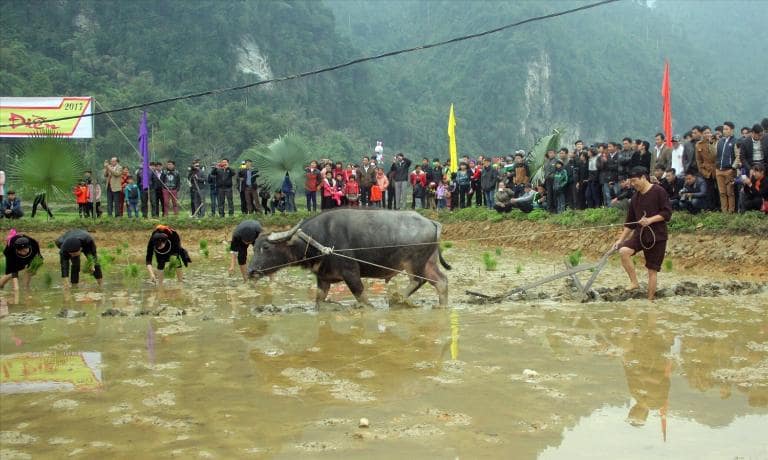
Conventional Hand Craftsmen
Skilled craftspeople, the Tay people in Thon Tha Village pass on age-old skills from one generation to the next. Weaving, in which people use hand looms to produce exquisite fabrics and textiles, is among the most prized Tay handicaps. Usually composed of locally grown hemp or cotton, these materials are dyed in natural hues and include complex designs reflecting Tay legacy.
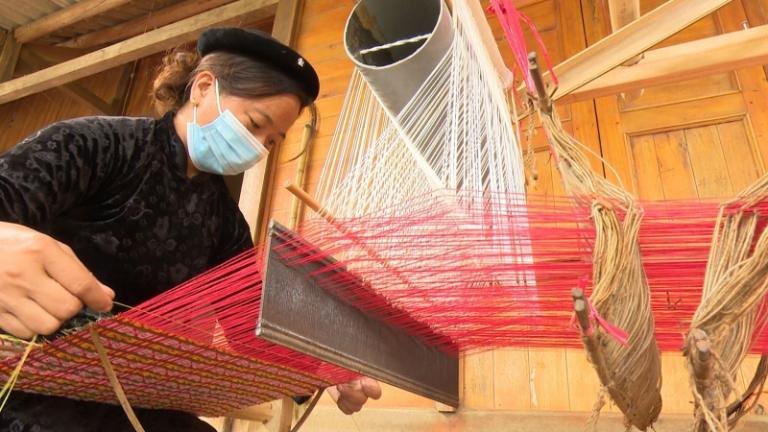
Usually women in the community weave, and every item created is one-of- a kind, expertly constructed creation. Visitors to the hamlet can see these craftspeople at work; some workshops even provide hands-on learning opportunities whereby guests may try weaving under the direction of local professionals.
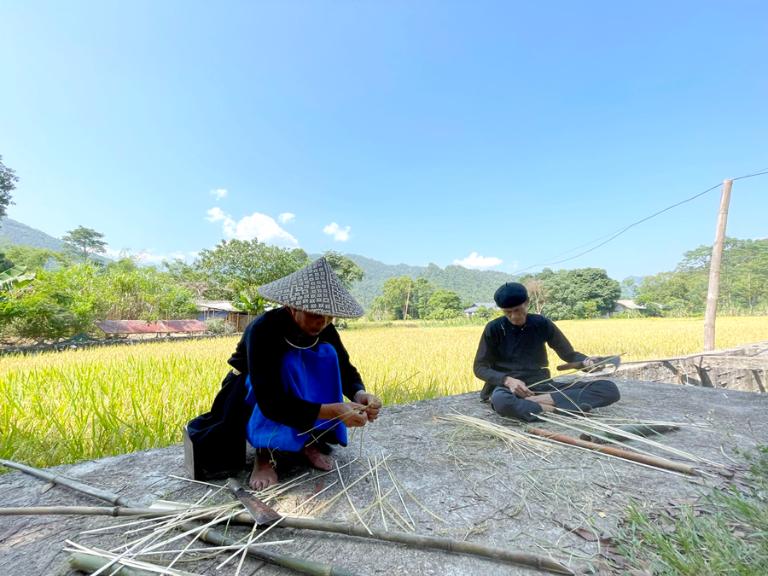
Bamboo and wood carving is another really significant skill in Thon Tha. Homes, tools, even musical instruments are created from these sculptures. Abundant in Ha Giang, bamboo is quite prized for its adaptability and sustainability. From baskets to musical flutes, local artists turn it into a range of objects that are all representative of Tay society.
Discover Thon Tha Village
Here, one can find a unique blend of rustic beauty, traditional customs, and breathtaking landscapes. Let’s explore the key experiences that make Thon Tha a must-visit destination for travelers seeking an authentic Vietnamese experience.
Breathtaking Rice Terraces
The Tay people labor meticulously on these terraces, which vary greatly with the seasons. The terraces are rich and green in spring and early summer; in the autumn they become a golden sea of mature rice. Not only is walking on these terraces aesthetically pleasing, but it also provides a window into the farming methods used by the community for countless centuries. These settings inspire photographers and nature enthusiasts often.
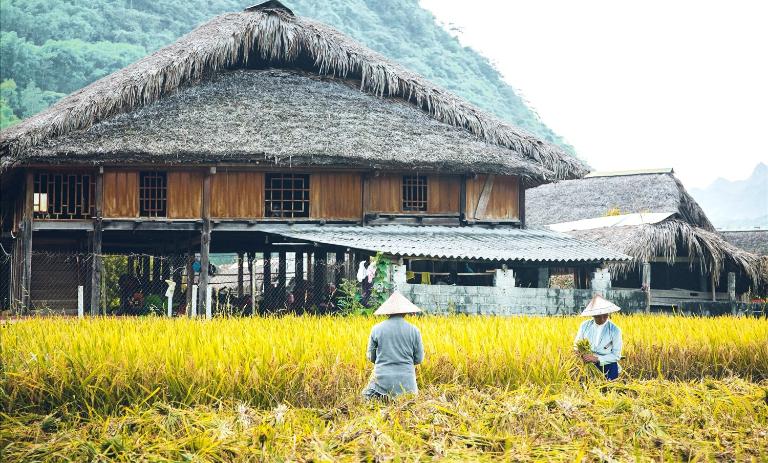
Nature Walks & Hiking Paths
Perfect for trekking and nature treks, Thon Tha is surrounded by amazing landscape. Many paths meander over the town and the nearby hills to provide expansive perspectives of Ha Giang’s terrain. These hikes span easy walks fit for beginners to more difficult paths appropriate for experienced hikers. Visitors may also come across other ethnic settlements along the trip, therefore augmenting the cultural diversity of the travel.
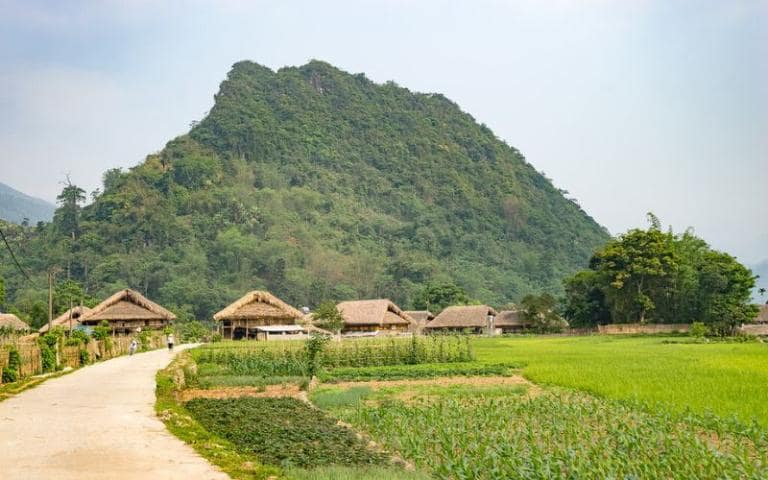
Acquiring Handicrafts and Traditional Crafts
Thon Tha visitors can pick up traditional Tay handicaps such needlework, bamboo cutting, and weaving. The village’s residents are adept at making items with both utilitarian and decorative purposes as well as fabrics and baskets. Many seminars provide practical hands-on activities whereby guests may try bamboo cutting or weaving under the direction of a local specialist.
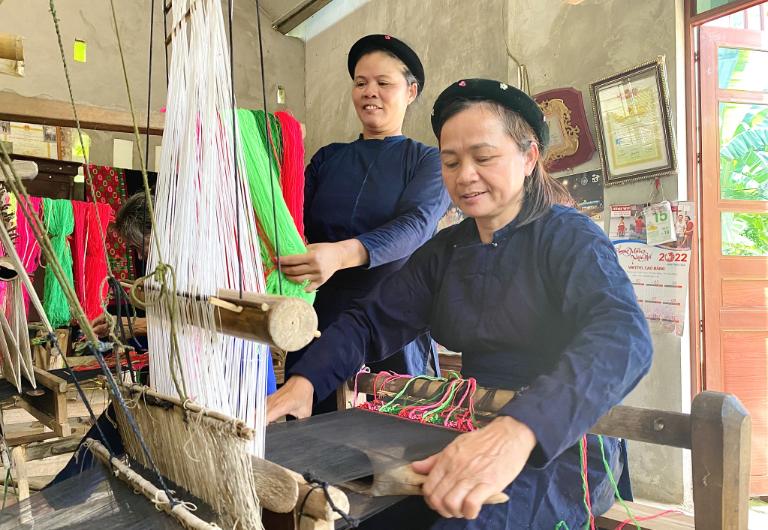
Conventional Tay Cooking
Without sampling the native cuisine, no visit to Thon Tha is complete. Simplicity and focus on fresh, natural ingredients define Tay food. Popular delicacies are thit lon cap nach (cap nach pork), com lam (bamboo sticky rice), and several soups and broths created with mountain herbs and mushrooms.
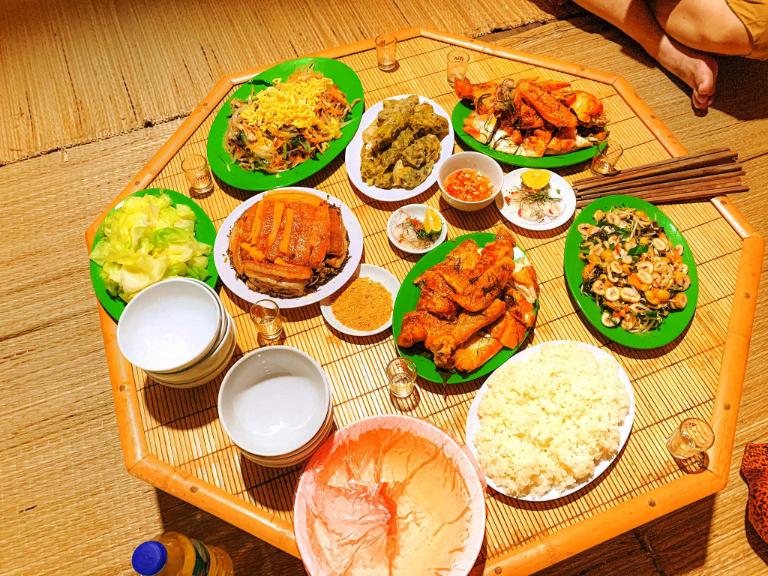
Many of the ingredients in these recipes are gathered from the nearby forests, therefore reflecting the intimate interaction between the Tay people and their surroundings. Homestay visits, when guests are invited to participate in cooking and dining, typically coincide with culinary adventures.
Where to Stay When Visiting Thon Tha Village
Unlike busy tourist destinations, Thon Tha’s hotels give serenity, simplicity, and the opportunity for visitors to really experience the local way of life top priority. These are some well-liked hotel options for a unique visit in Thon Tha:
Homestays in Traditional Tày Stilt Houses
Staying in a typical Tày stilt house homestay is one of the pleasures of a visit to Thon Tha. Usually constructed from wood with palm-thatched roofs, these rustic but cosy houses have open areas that view the nearby rice fields and mountain settings. From cooking together to exchanging stories, staying with a local family lets guests experience the everyday rhythm of village life and obtain first knowledge of Tày customs and traditions.
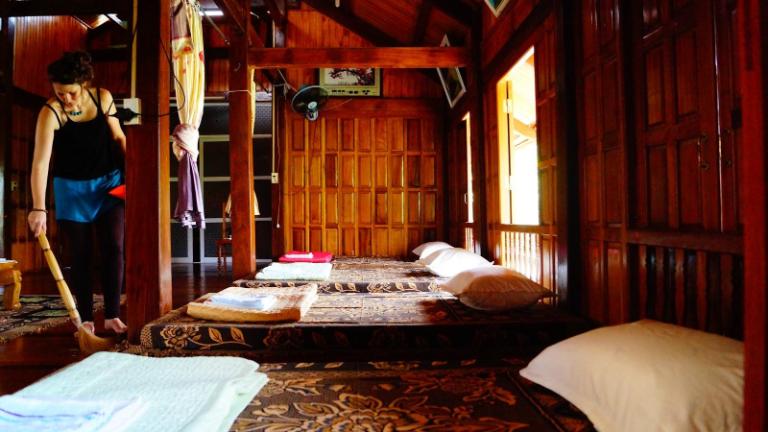
Mini-Hotels and Guesthouses in Ha Giang City
Mini-hotels and guesthouses in Ha Giang City are a good choice for anyone who would want a little more modern conveniences and ease. These reasonably priced hotels, which are a short drive from Thon Tha Village, provide easy access to city services. After a day of exploring the village, guests can return to the city for dining, shopping, and a restful night’s sleep.

Thon Tha Village captures the heart of Vietnam’s mountain charm, offering travelers a peaceful retreat into nature and tradition. For those seeking a true cultural experience, this village promises unforgettable memories and a deeper connection to the beauty of Ha Giang.
Related Posts:
- Thon Tha Village: A Serene Haven at the Foot of Tay Con Linh
- Pa Vi Village: A H’Mong Cultural Haven in Nature’s Embrace
- Thien Huong Village: The Century-Old Ancient Village at the Nation’s Edge
- The Simple Beauty Of Buckwheat Flower Valley In Ha Giang
- Chieu Lau Thi: Discover Majestic Trekking Trails And Stunning Views












Be the first to comment!